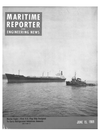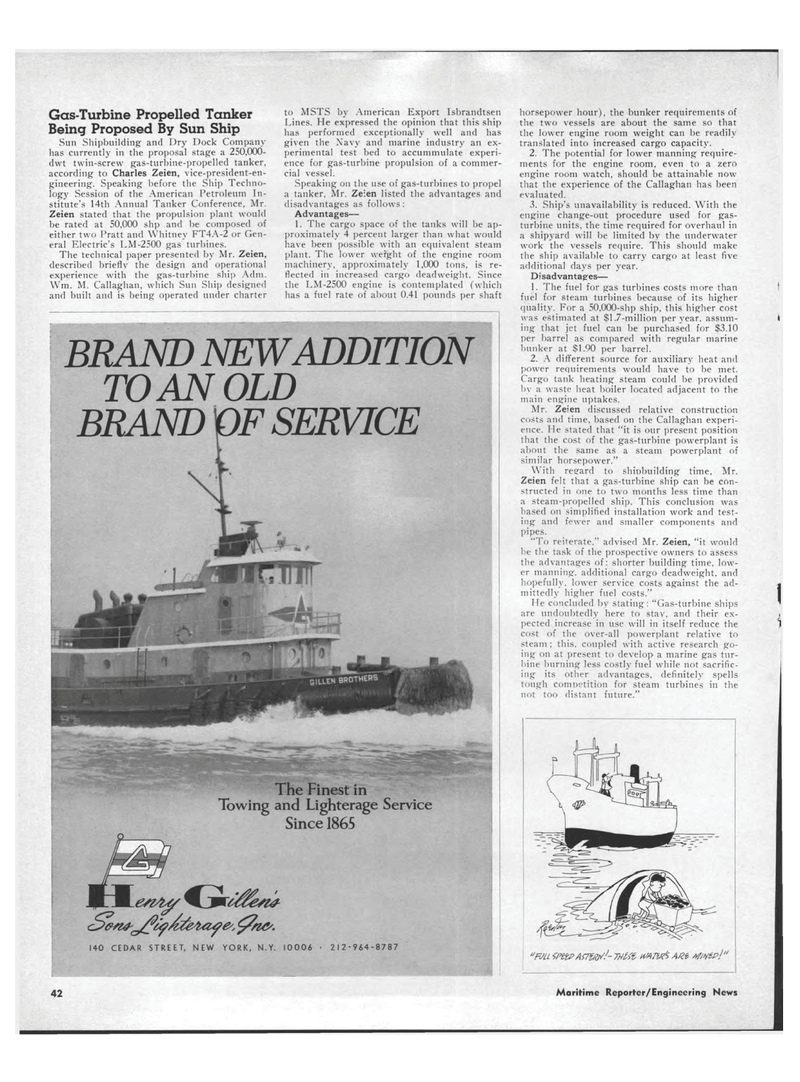
Page 40: of Maritime Reporter Magazine (June 15, 1969)
Read this page in Pdf, Flash or Html5 edition of June 15, 1969 Maritime Reporter Magazine
Gas-Turbine Propelled Tanker Being Proposed By Sun Ship Sun Shipbuilding and Dry Dock Company has currently in the proposal stage a 250,000-dwt twin-screw gas-turbine-propelled tanker, according to Charles Zeien, vice-president-en-gineering. Speaking before the Ship Techno-logy Session of the American Petroleum In-stitute's 14th Annual Tanker Conference, Mr. Zeien stated that the propulsion plant would be rated at 50,000 slip and be composed of either two Pratt and Whitney FT4A-2 or Gen-eral Electric's LM-2500 gas turbines. The technical paper presented by Mr. Zeien, described briefly the design and operational experience with the gas-turbine ship Adm. Wm. M. Callaghan, which Sun Ship designed and built and is being operated under charter to MSTS by American Export Isbrandtsen Lines. He expressed the opinion that this ship has performed exceptionally well and has given the Xavy and marine industry an ex-perimental test bed to accummulate experi-ence for gas-turbine propulsion of a commer-cial vessel. Speaking on the use of gas-turbines to propel a tanker. Mr. Zeien listed the advantages and disadvantages as follows: Advantages? 1. The cargo space of the tanks will be ap-proximately 4 percent larger than what would have been possible with an equivalent steam plant. The lower wefght of the engine room machinery, approximately 1,000 tons, is re-flected in increased cargo deadweight. Since the LM-2500 engine is contemplated (which has a fuel rate of about 0.41 pounds per shaft horsepower hour), the bunker requirements of the two vessels are about the same so that the lower engine room weight can be readily translated into increased cargo capacity. 2. The potential for lower manning require-ments for the engine room, even to a zero engine room watch, should be attainable now that the experience of the Callaghan has been evaluated. 3. Ship's unavailability is reduced. With the engine change-out procedure used for gas-turbine units, the time required for overhaul in a shipyard will be limited by the underwater work the vessels require. This should make the ship available to carry cargo at least five additional days per year. Disadvantages? 1. The fuel for gas turbines costs more than fuel for steam turbines because of its higher quality. For a 50,000-shp ship, this higher cost was estimated at $1.7-million per year, assum-ing that jet fuel can be purchased for $3.10 per barrel as compared with regular marine bunker at $1.90 per barrel. 2. A different source for auxiliary heat and power requirements would have to be met. Cargo tank heating steam could be provided bv a waste heat boiler located adjacent to the main engine uptakes. Mr. Zeien discussed relative construction costs and time, based on the Callaghan experi-ence. He stated that "it is our present position that the cost of the gas-turbine powerplant is about the same as a steam powerplant of similar horsepower." With reeard to shipbuilding time, Mr. Zeien felt that a gas-turbine ship can be con-structed in one to two months less time than a steam-propelled ship. This conclusion was based on simplified installation work and test-ing and fewer and smaller components and pipes. "To reiterate." advised Mr. Zeien, "it would he the task of the prospective owners to assess the advantages of: shorter building time, low-er manning, additional cargo deadweight, and hopefully, lower service costs against the ad-mittedly higher fuel costs." He concluded by stating: "Gas-turbine ships are undoubtedly here to stav, and their ex-pected increase in use will in itself reduce the cost of the over-all powerplant relative to steam ; this, coupled with active research go-ing on at present to develop a marine gas tur-bine burning less costly fuel while not sacrific-ing its other advantages, definitely spells tough competition for steam turbines in the not too distant future." "FVUWttPAffltf-'-T/JKt- U/AW&A/Zi rfwtp!" BRAND NEW ADDITION TO AN OLD BRAND IOF SERVICE The Finest in Towing and Lighterage Service Since 1865 140 CEDAR STREET, NEW YORK, N.Y. 10006 ? 212-964-8787 42 Maritime Reporter/Engineering News

 39
39

 41
41
